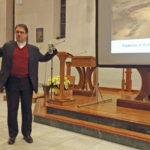
Campaign ads inundate our email inboxes, Facebook pages, text messages, Twitter accounts, TV screens and radio stations as the 2020 president campaign ramps into high gear. These vitriolic messages distort candidates’ positions on the issues, making it even more difficult to discern where a candidate truly stands regarding the teachings of our church.
Faithful Citizenship, a 53-page document from the U.S. Conference of Catholic Bishops (USCCB), provides thoughtful, inspiring guidance for all of us, letter writers and readers (usccb.org).The USCCB offers excellent, brief videos that address church teaching (https://tinyurl.com/y4fkltym) and complement the Faithful Citizenship document. Here is a sample of guidance from the document:
• Formation of conscience: study sacred Scripture and the teaching of the church contained in the Catechism of the Catholic Church. Examine facts and background information about various choices. Engage in prayerful reflection to discern the will of God. Failing to form our consciences in the light of the truths of the faith and moral teachings of the church can cause us to make erroneous judgments (No. 18).
• A good end does not justify an immoral means. We advance the common good by defending the inviolable sanctity of human life from the moment of conception until natural death, promoting religious freedom, defending marriage, feeding the hungry, housing the homeless, welcoming the immigrant and protecting the environment. Not all possible courses of action are morally acceptable. “We have a responsibility to discern carefully which public policies are morally sound. Catholics may choose different ways to respond to compelling social problems, but we cannot differ on our moral obligation to help build a more just and peaceful world through morally acceptable means, so that the weak and vulnerable are protected and human rights and dignity are defended” (No. 20).
• The right to life is linked to other human rights; the things that every person needs to live and thrive. We have a moral obligation to respond to the needs of our neighbors for such things as food, shelter, health care, education and meaningful work. Catholics must seek the best way to respond to those needs (No. 25).
• A “consistent ethic of life” … “does not treat all issues as morally equivalent nor does it reduce Catholic teaching to one or two issues. It anchors the Catholic commitment to defend human life, from conception until natural death, in the fundamental moral obligation to respect the dignity of every person as a child of God.” This culture of life “begins with the preeminent obligation to protect innocent life from direct attack and extends to defending life whenever it is threatened or diminished: Any politics of human dignity must seriously address issues of racism, poverty, hunger, employment, education, housing, and health care” (No. 40).
• “Catholic voters should use the framework of Catholic social teaching to examine candidates’ positions on issues affecting human life and dignity as well as issues of justice and peace, and they should consider candidates’ integrity, philosophy, and performance” (No. 41).
• Catholics are not single-issue voters. “A candidate’s position on a single issue is not sufficient to guarantee a voter’s support. Yet if a candidate’s position on a single issue promotes an intrinsically evil act, such as legal abortion, redefining marriage in a way that denies its essential meaning, or racist behavior, a voter may legitimately disqualify a candidate from receiving support” (No. 42).
This week’s issue contains other articles related to forming our consciences as faithful citizens so that we go to the polls or cast an absentee ballot that reflects church teaching that places the well-being of society above self-interest.
“Conscience is the voice of God resounding in the human heart, revealing the truth to us and calling us to what is good while shunning evil” (Forming Consciences for Faithful Citizenship).
Barb Arland-Fye, Editor
Arland-fye@davenportdiocese.org











